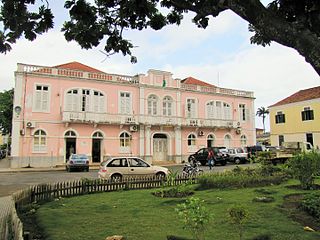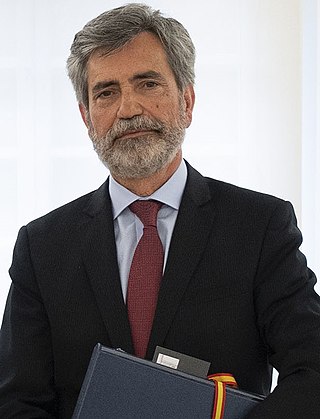
The Supreme Justice Tribunal is the highest court of law in the Bolivarian Republic of Venezuela and is the head of the judicial branch. As the independence of the Venezuelan judiciary under the regime of Nicolás Maduro is questioned, there have recently been many disputes as to whether this court is legitimate.

The Supreme Court of Puerto Rico is the highest court of Puerto Rico, having judicial authority to interpret and decide questions of Puerto Rican law. The Court is analogous to one of the state supreme courts of the states of the United States and is the highest state court and the court of last resort in Puerto Rico. Article V of the Constitution of Puerto Rico vests the judicial power in the Supreme Court, which by nature forms the judicial branch of the government of Puerto Rico. The Supreme Court holds its sessions in San Juan.

The United States District Court for the District of Puerto Rico is the federal district court whose jurisdiction comprises the Commonwealth of Puerto Rico. The court is based in San Juan. The main building is the Clemente Ruiz Nazario United States Courthouse located in the Hato Rey district of San Juan. The magistrate judges are located in the adjacent Federico Degetau Federal Building, and several senior district judges hold court at the Jose V. Toledo Federal Building and U.S. Courthouse in Old San Juan. The old courthouse also houses the U.S. Bankruptcy Court. Most appeals from this court are heard by the United States Court of Appeals for the First Circuit, which is headquartered in Boston but hears appeals at the Old San Juan courthouse for two sessions each year. Patent claims as well as claims against the U.S. government under the Tucker Act are appealed to the Federal Circuit.

The General Council of the Judiciary is the national council of the judiciary of Spain. It is the constitutional body that governs all the Judiciary of Spain, such as courts, and judges, as it is established by the Spanish Constitution of 1978, article 122 and developed by the Organic Law 6/1985 of the Judicial Power (LOPJ). The President of the CGJP is also the president of the Supreme Court.
José Antonio Andreu García was a Puerto Rican jurist who served as the 13th chief justice of the Supreme Court of Puerto Rico from 1992 to 2003. He was known for his moderate approach to constitutional law.

The Supreme Court is the highest court in the Kingdom of Spain. The court has original jurisdiction over cases against high-ranking officials of the Kingdom and over cases regarding the legalization of political parties. It also has ultimate appellate jurisdiction over all cases. The Court has the power of judicial review, except for the judicial revision on constitutional matters, reserved to the Constitutional Court.

The 1940 Constitution of Cuba was implemented during the presidency of Fulgencio Batista on 10 October 1940. It was primarily influenced by the collectivist ideas that inspired the Cuban Revolution of 1933. Widely considered one of the most progressive constitutions at the time, it provided for land reform, public education, a minimum wage and other social programs. It had 286 articles in 19 sections.

The Supreme Court of Costa Rica is the court of greater hierarchy of Law and Justice in Costa Rica.

The Plurinational Electoral Organ is the independent electoral branch of the government of Bolivia. It replaced the National Electoral Court in 2010.
The Supreme Court of Justice is the highest court of ordinary jurisdiction in Bolivia, based in Sucre. Its powers are set out in Articles 181–185 of the 2009 Constitution and the Law of the Judicial Organ. It was first seated on 2 January 2012.
The Judiciary of Puerto Rico is defined under the Constitution of Puerto Rico and consists of the Supreme Court of Puerto Rico, Court of Appeals, and the Court of First Instance consisting of the Superior Courts and the Municipal Courts.

Maite Oronoz Rodríguez is a Puerto Rican jurist who currently serves as the 17th Chief Justice of the Supreme Court of Puerto Rico since 2016. Oronoz Rodríguez is Puerto Rico's first openly gay chief justice.

The Constitution of Costa Rica is the supreme law of Costa Rica. At the end of the 1948 Costa Rican Civil War, José Figueres Ferrer oversaw the Costa Rican Constitutional Assembly, which drafted the document. It was approved on 1949 November 7. Several older constitutions had been in effect starting from 1812, with the most recent former constitution ratified in 1871. The Costa Rican Constitution is remarkable in that in its Article 12 abolished the Costa Rican military, making it the second nation after Japan to do so by law. Another unusual clause is an amendment asserting the right to live in a healthy natural environment.
The Judiciary of Angola is defined by the Constitution of Angola, which outlines the structure of a Unified Justice System. The courts are intended to be independent sovereign bodies administering impartial justice on behalf of the people. Their duty is to guarantee and ensure compliance with the Constitutional and other laws in force, to protect the rights and interests of citizens and institutions and to decide on the legality of administrative acts.

The Supreme Court of Justice is the highest judicial authority of São Tomé and Príncipe. It is located in a historic building in the centre of the capital city of São Tomé, between the Presidential Palace and the waterfront. The Supreme Court consists of five judges, that are appointed by the National Assembly.

Carlos Lesmes Serrano is a Spanish magistrate and prosecutor who served as president of the Supreme Court and president of the General Council of the Judiciary (CGPJ) from 2013 to 2022. Since December 2018, he served in acting capacity in both posts, as his mandate expired at the time and the renovation of the CGPJ was blocked from then on. He is seen as a Conservative jurist with a religious background.

Julián Artemio Sánchez Melgar, is a Spanish judge and prosecutor currently serving as magistrate of the Second Chamber of the Supreme Court. He was the 90th Attorney General of Spain from December 2017 to June 2018. Because of being attorney general he was also member of the Council of State. He is considered a Magistrate with a conservative profile.
The Supreme Tribunal of Justice of Venezuela (TSJ) in exile is an institution that some, including the Organization of American States, consider to be the legitimate highest court of law in Venezuela and the head of the judicial branch, as opposed to the Supreme Tribunal of Justice. It was established on 21 July 2017 following the 2017 Venezuelan constitutional crisis. The TSJ's 33 members have been based in Chile, Colombia, Panama, and the United States due to the political crisis in Venezuela.














